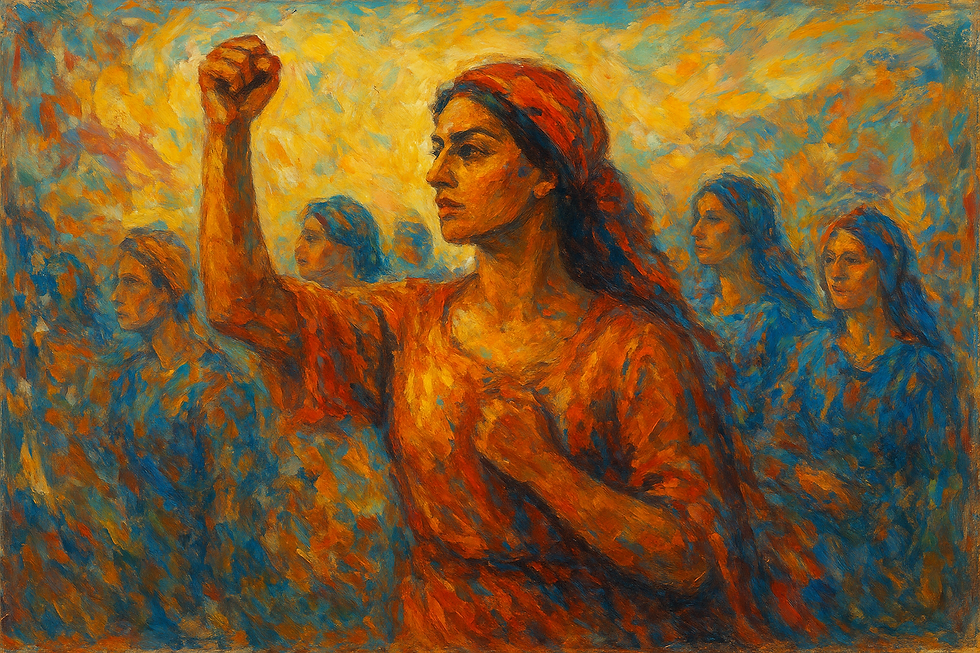The Arab Woman Between the Digital Revolution and the Prisons of Tradition
- Sahar Hasballah Abed

- Oct 26, 2025
- 3 min read
By Sahar Hasballah Abed

The digital revolution has opened unprecedented horizons for Arab women. Through it, they have found a space to freely express themselves, share their thoughts and experiences with the world, and turn long-silenced voices into collective issues that resonate across Arab and global societies alike. A woman’s online presence is no longer a mere virtual appearance, it has become a tool of influence and participation, granting her the ability to break her traditional silence and assert her true role in society.
Yet this digital freedom is far from absolute. While technology offers vast space for expression, social constraints, rigid traditions, and restrictive laws continue to limit how freely women can exercise that right in real life. Thus, the digital world becomes a double-edged space: freedom on the screen, confinement in daily life, where every post or comment becomes a direct test of a woman’s courage to confront norms and boundaries.
In many cases, women have faced direct threats due to their digital presence. Society might tolerate certain expressions, but it becomes harsh toward any voice that defies convention or challenges norms. Still, women are no longer silent; they have found in digital platforms a space for awareness and resistance, where personal stories turn into collective movements, and a single word can pressure change in laws or public opinion.
There are countless examples of this transformation. In Jordan, journalist Rana Husseini exposed so-called “honor killings,” helping to push for legal reform. In Egypt, activists launched online campaigns against harassment, prompting authorities to adopt stricter safety measures. In Lebanon and Morocco, women founded digital platforms for empowerment and anti-violence advocacy, leading to concrete improvements in protection policies and public awareness. These examples reflect the transformative power of digital expression, and the risks faced by those who challenge traditional limits.
Technology, in this sense, is no longer just a tool for communication; it has become a battlefield. Every post, video, or comment represents an act of silent resistance to marginalization. Here emerges a new form of women’s leadership, unofficial yet deeply influential, navigating between the digital and real worlds, between ambition and fear, redefining presence through initiative and boldness.
Digital freedom has created a new language of struggle. The internet has become an open classroom, a space for learning and exchanging experiences, and a means of reshaping social awareness. Even girls in remote villages , once silenced by distance and convention , can now learn, share, and voice their opinions freely, drawing inspiration from women in urban centers.
Still, reality remains harsh. Social threats and legal punishments persist, forcing women to develop new tools such as digital storytelling, rights documentation, and safe awareness practices. Thus, technology transforms from a space of expression into an instrument of power and accountability.
The story of Arab women between the digital revolution and the prisons of tradition is not a passing phenomenon, it is a daily reality that mirrors society’s own struggle with change. Every successful digital experience inspires another, and every heard voice ripples beyond the screen into streets, institutions, and lawmaking arenas.
The digital revolution is no longer confined to major cities; it has reached smaller and more conservative communities. In rural areas, mobile phones have become instruments of liberation, knowledge, and connection. The true strength of women lies in their ability to turn individual voices into collective movements capable of reshaping laws and driving social reform.
Today, Arab women employ a variety of tools, blogging, video content, podcasts, and organized online campaigns, to deliver their messages and exercise a new, nontraditional form of leadership built on persuasion and influence rather than authority. Yet, the greatest challenge remains: balancing digital freedom with real-world protection, ensuring that women are not punished for daring to be heard.
The digital revolution alone is not enough. It must be accompanied by cultural and social reform that instills respect for women’s rights and transforms digital awareness into tangible social change. The true power of Arab women lies in their ability to use technology as a force for legal and social transformation, paving the way toward a more just and equal society.
Today, a woman’s digital presence has become an extension of collective memory, a stage for asserting existence, and a chronicle of dreams and aspirations no longer confined by walls. Each post, each share, each testimony adds a new page to the record of women’s resistance , affirming that a voice once unsilenced will always find its way to the light, reshaping both awareness and reality.
Sahar Hasballah Abed, Iraqi writer and poet, recipient of multiple Arab and international literary awards, and a member of the Iraqi Union of Writers and Authors.
The opinions expressed in this article are solely the author’s and do not represent the views of Nisaba Media.





Comments